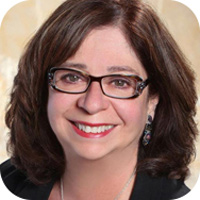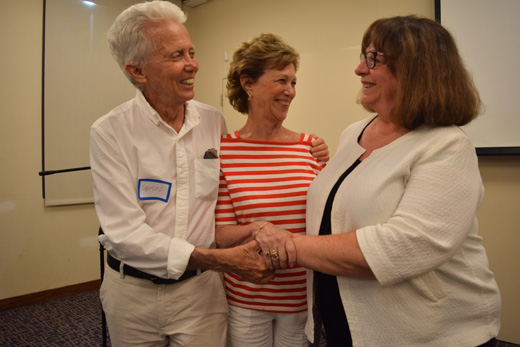

SAN DIEGO – As Arlene Bernstein became less and less “observant”of halacha in her religious practice, she became more and more deeply involved in Jewish life. Today she is a cantor as well as a rabbi. And for the next year, she is serving as the Acting Senior Rabbi of the largest and oldest Jewish congregation in San Diego, Congregation Beth Israel.
In a speech Wednesday evening, Aug. 21 sponsored by the Beth Israel Men’s Club, Bernstein traced her journey from Jewish Orthodoxy to Jewish Conservatism to the movement in which she is now a local leader, Jewish Reform.
The grandchild of immigrants from Eastern Europe, Bernstein grew up in Washington, D.C. Her grandparents were modern Orthodox. She attended Bais Yaakov, a school in which, even in preschool, boys and girls sat on separate sides of the room. Under the tutelage of that Orthodox institution, Bernstein learned about Jewish law and customs, to pray, and to read and write Hebrew – even before she learned to read and write in English. “It was a remarkable opportunity,” she commenbted
Her parents eventually enrolled her in a public school and joined a Conservative congregation. There she flourished, serving as the director of the children’s choir and participating with peers in the United Synagogue Youth movement.
Music was always a key interest, fostered by a family that decided which congregation’s Shabbat service they would attend only after reading which cantor was singing where. Bernstein learned to play the piano, started to learn the clarinet, and then switched to the bassoon before graduating from the University of Maryland.
In college, she said, she went “AWOL from Judaism,” her Friday nights typically spent attending a concert rather than an Erev Shabbat service. She went to as many concerts as she could, deciding “I wanted to be a professional bassoonist.” In pursuit of this, she attended the New England Conservatory of Music in Boston. While auditioning to sing and play clarinet for an Israeli dance troupe, Bernstein met auditioning violinist Myla Wingard (whose mother Eileen Wingard writes about music for San Diego Jewish World). Myla later would be among the first to welcome her to San Diego.
In Massachusetts, Bernstein taught and performed in chamber music groups, and in conjunction with the Israeli Folk Dance Group Ha Makor led a band that included Myla. Bernstein also started teaching at a religious school – “I thought that was a good way to maintain my Jewish identity” – and “started to do some singing.”
The rabbi said “the singing carried me and all of a sudden, I became passionate again about Judaism and Jewish music.” At one point, after visiting San Diego, she thought she might apply for a position with the San Diego Symphony, but that was the time that financial troubles forced it to close down temporarily. Realizing that wasn’t bashert, Bernstein decided to apply, and got accepted, as a student at the Jewish Theological Seminary, which is an arm of the Conservative movement.

Her application, while accepted, caused a little bit of nervousness when Bernstein told of her plan to become a cantor. Among observant Jews, there is the doctrine of kol isha (a woman’s voice), which when strictly interpreted prohibits men from listening to a woman singing, except in the case of the man’s own family member – “the idea,” said Bernstein, that a woman’s voice is alluring so you shouldn’t be doing that in synagogue.”
“That hasn’t worked for me,” quipped Bernstein, who is single. “Not yet, but still, you never know.”
She attended JTS in Jerusalem for a year, supporting herself by playing the bassoon in The Kibbutz Chamber Orchestra of Israel that toured not only in Israel, but in Europe as well. She went to Germany with some reluctance because of the Holocaust’s legacy, and told of meeting one man whose Jewish family was spared because his father had saved hundreds of German lives during World War I.
Playing for the kibbutz orchestra, which was secular, meant she had to travel on Shabbat, which contravened the rules of the Conservative movement. Rather than be conflicted, she decided to enroll at the Reform Movement’s Hebrew Union College in Jerusalem, where Cantor William Sharlin, z”l, interceded in her behalf, saying “I think you should take her.” Commented Bernstein: “If not for him, I would not be a cantor today.”
While studying from 1989 to 1993 for the cantorate, she served as a student cantor at congregations in Connecticut and New York State. After her graduation, her first pulpit was in Long Island. At one point, the rabbi there was hospitalized for several months, and in what perhaps what was a harbinger of things to come, she served both as the cantor and the acting rabbi. “It gave me that first inkling that maybe what I wanted was more than a pastoral cantorate, more than singing and teaching and counseling.”
In 1997, Bernstein came to Congregation Beth Israel as a cantor, soon thereafter having a reunion with Myla Wingard. Bernstein’s first senior rabbi was Rabbi Jonathan Stein, whom she credited with providing her with insight into the problems of interfaith families. A mentor was the congregation’s cantor emeritus, Cantor Sheldon Merel, who was in the audience on Wednesday evening.
In 2003, Bernstein made a fateful decision: she applied for entry in the rabbinical program of Hebrew Union College in Los Angeles. That meant regularly commuting to Los Angeles for her studies, while still serving the large congregation as a pastoral cantor, meaning she not only led the congregation in prayerful song, but also visited the sick in hospitals, grieved with families at shivas, and participated in every other variety of life cycle events. She was ordained in 2011, earning the double title of Rabbi/ Cantor.
Earlier this year, Rabbi Michael Berk retired as the senior rabbi of Congregation Beth Israel. A search is underway for a successor. If the congregation follows accepted practice, it will settle on someone in mid-career, someone who can serve the congregation for 20 or more years, even as Bernstein has served a full generation. She has conducted weddings, buried grandparents, and welcomed newborns into families. She related that one boy commented to her at his bar mitzvah, that as he had been involved in his early life, she probably also would be the person to officiate at his wedding someday.
During the year-long search period, Bernstein, in effect, will be holding down three jobs – cantor, pulpit rabbi, and acting senior rabbi. In the latter role, she supervises the clerical staff. Recently, Rabbi Philip Graubart, a former senior rabbi at Congregation Beth El (which is Conservative), agreed to join a rotation of rabbis teaching Torah at Congregation Beth Israel. These rabbis include Lenore Bohm, Martin Lawson, Jeremy Gimbel and Paula Reimers.
While Bernstein is not applying to become the full-time senior rabbi, she said at some time in her career, perhaps after her retirement from Beth Israel, she might like to occupy a rabbinical pulpit in a small congregation.
Asked what she considers to be the ideal relationship between a rabbi and a cantor, she said it should be ones in which they consult frequently, and take on tasks based upon their particular strengths. Some clergy members like pastoral counseling; others do not, she said. Ways should be found for both the rabbi and the cantor to follow his or her forte. However, she added, it should be remembered that it is the rabbi in small congregations, and the senior rabbi in larger one, who has the final say.
The rabbi/ cantor commented after her speech that amidst a congregation of 1100 families, she feels that she is part of a very large, extended family.
*
Harrison is editor of San Diego Jewish World. He may be contacted via donald.harrison@sdjewish